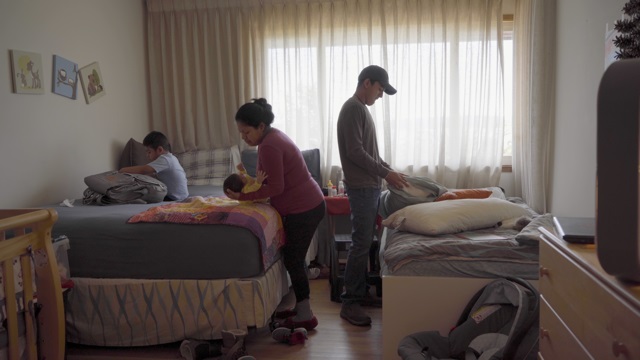All We Carry (Voge, 2024)
The Full Frame Documentary Film Festival returns to Durham later this week after a one-year hibernation. Cady Voge’s All We Carry gets the coveted Fletcher Hall location, meaning tickets should be available all the way up to the Friday afternoon screening. The festival does screen some prize winners and audience favorites on Sunday afternoon, but most films get only one guaranteed screen time, so plan accordingly.
All We Carry is a story about immigration, making it longitudinal. It covers several years in the life and journey of Magdiel, Mirna, and their son, Joshua as they navigate the treacherous roads from Honduras to the United States border and the complex legal system that hears their appeal for asylum.
When the film opens, we get an efficient framing newscast that reminds us that the reason the migrants travel in groups is to protect themselves from narcotraffickers that would prey on those with no recourse from the governments of the lands they are passing through. This fact is somehow lost on American audiences who rarely read or listen beyond sensationalized headlines, and, at its best, the documentary is able to humanize the drearily familiar political talking points.
The film also avoids seeming too derivative by following the migrants off the road and into the courthouse. Films about the dangers of the road to the displaced are not uncommon (though in the United States we might be slightly more comfortable with homelessness being the frame for such narratives). Films about the labyrinthian nature of the court system are also not totally unknown. (Think The Visitor or The Mauritanian or even Amistad.) By combining the two, however, All We Carry makes the back half feel all the more excruciating. The accumulation of little slights and smaller hurdles drains whatever hope or energy we might have on the subjects’ behalf.
The one big problem I had with the film is that it wasn’t always clear to me how the presence of the camera altered the experience it was documenting, if at all. When there is one spot left on a bus and the couple separated, are we really to believe they may never see each other again nor know what happens to one another? Is the threat of attacks from narcotraffickers on the streets of Mexico offset by the size of the caravan or the presence of the media? Does being observed change the way that others interact with the migrants? If so, how representative is the experience we see? Or is it curated? Since Voge received a JFI Completion Grant to finish the film, did that impact the ways she integrated or represented the antisemitic violence that impacted the Hondurans’ sponsors?
None of these questions invalidate the film’s emotional power, but they do add a layer of complexity to an already complex issue.

